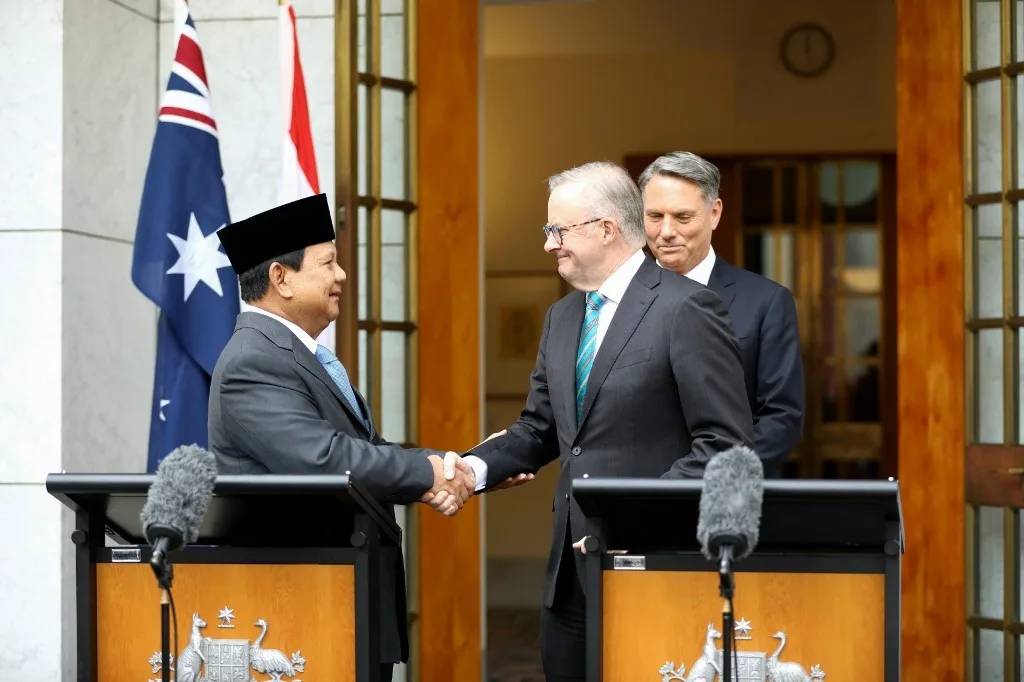Indo-Pacific Cooperation in Action
 Indo-Pacific Cooperation in Action
Indo-Pacific Cooperation in ActionReflecting growing regional collaboration, Indonesia and Australia have reaffirmed their dedication to a common vision for Indo-Pacific stability in a major gesture. Indo-Pacific Cooperation in Action Emphasizing the need of preserving peace, security, and prosperity in a region increasingly defined by geopolitical tensions and strategic competition, this new alignment was underlined at recent high-level discussions between leaders of the two neighbouring countries.
Based in geographic closeness, economic interdependence, and shared democratic values, Indonesia and Australia have enjoyed a long-standing bilateral relationship. Both countries have come to see over time how closely their security and prosperity entwine. Their dedication to cooperate on regional challenges including maritime security, trade, climate change, and counterterrorism is shown by their most recent reaffirmation of their common Indo-Pacific vision.
Australian Prime Minister Anthony Albanese and Indonesian President Joko Widodo have both said they want their nations’ relationship to be more strategically elevated. This was clear in a sequence of bilateral talks and agreements emphasizing intelligence sharing, military training, and defence collaboration. The leaders underlined that stability and peace in the Indo-Pacific are not only regional concerns but also very essential for the world rules-based system.
Anchored in respect for international law, especially the United Nations Convention on the Law of the Sea (UNCLOS), central to the common vision is the maintaining of a rules-based international order. Particularly in disputed territory of the South China Sea, Indonesia and Australia have jointly expressed their worry over rising unilateral activities endangering freedom of navigation and overflight.
Both nations have underlined once more the need of ASEAN centrality in handling regional conflicts and preserving diplomatic interaction with big powers. Australia’s acceptance of ASEAN-led institutions such as the ASEAN Regional Forum and the East Asia Summit fits Indonesia’s lengthy advocacy for a fair and inclusive regional architecture. Through strengthening multilateralism and diplomacy, Indonesia and Australia hope to keep the Indo-Pacific from turning into a theatre of great power conflict.
Apart from security, economic cooperation stays pillar of the Indonesia-Australia bond. Comprising the Indonesia-Australia Comprehensive Economic Partnership Agreement (IA-CEPA), which went into effect in 2020, it has given a structure for increasing trade, investment, and digital economy alliances. Particularly considering interruptions brought on by the COVID-19 epidemic and world conflicts, recent talks have concentrated on strengthening supply chain resilience and promoting more connectedness between the two economies.
Australia has also shown great support for Indonesia’s development agenda, which includes its bold ideas for the new capital city, Nusantara. Projects involving green energy, education, and infrastructure are supposed to strengthen economic connections and help both nations to develop sustainably. Both countries aspire to generate inclusive development across the Indo-Pacific by coordinating economic cooperation with regional development projects such the Master Plan on ASEAN Connectivity.
Within the strategic alliance between Indonesia and Australia, maritime cooperation has grown in significance. Both nations have stepped up coordinated patrols, naval exercises, and anti-illegal fishing and transnational criminal measures along their large coastlines and shared marine boundaries. Programs for capacity-building and maritime domain understanding have helped to increase their capacity to handle shared concerns even more.
A major concern for both countries, climate change has also been rather visible in bilateral talks. With an eye especially on renewable energy development, forest preservation, and catastrophe risk reduction, Australia and Indonesia have promised to work on climate adaptation and resilience. Meeting emissions objectives and safeguarding sensitive populations in the Indo-Pacific depend on cooperative efforts on climate finance and technology transfer.
The people-to-personal link of the Indonesia-Australia relationship is sometimes underappreciated but is essential. Trust and mutual understanding have grown out of educational exchanges, cultural activities, and young leadership projects. To strengthen linkages in society, both governments have promised to increase professional contacts, language instruction, and scholarships programs.
Particularly the Australia Awards and the New Colombo Plan have let thousands of Australian and Indonesian students’ studies and work abroad. These interactions help one grow personally as well as foster a closer respect of common ideals and regional interests. Maintaining the long-term viability of bilateral cooperation and Indo-Pacific involvement is seen dependent on strengthening these ties.
The cooperation between Indonesia and Australia provides a paradigm of pragmatic diplomacy and strategic alignment as the Indo-Pacific develops among world uncertainty. Reiterating their shared vision for stability, both countries indicate their intention to be active in helping to shape the future of the area Their cooperation emphasizes the need of regional unity and mutual respect whether addressing conventional security issues or seizing fresh possibilities in the digital and green industries.
Indonesia and Australia are positioned to lead regional efforts toward a more peaceful, rich, and resilient Indo-Pacific even if obstacles still exist from managing great power competition to addressing the effects of climate change. Their alliance, based on mutual interests and shared values, is more vital than ever in a world when overcoming difficult global challenges depends on more cooperation than ever.












